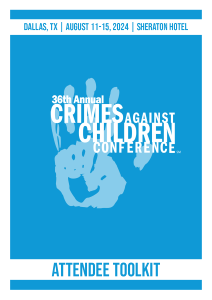Workshop
Marriott
Developmental Considerations in the Forensic Interview (Part 1) REPEAT
Wednesday, August 14, 2024
8:30 AM - 9:45 AM CT
Location: Pegasus AB
Credit Hours: 1.25
- CA
Cari Allen
Forensic Interviewer/Program Director
Child Advocacy Center of Jackson County 
Katie Greathouse (she/her/hers)
Child Forensic Interviewer/Program Manager
Mt. Emily Safe Center
Primary Presenter(s)
Co-Presenter(s)
Understanding child and adolescent development is of utmost importance when conducting forensic interviews. Development impacts a child/adolescent’s ability to participate in the forensic interview in every way. Using techniques that match the child/adolescent’s developmental needs is imperative to producing reliable and accurate information in the forensic interview. Understanding child development helps interviewers recognize how development impacts the child’s abilities and limitations during the forensic interview. This 2-part presentation will discuss characteristics of children in the following areas of development; language, cognition, and social/emotional development. Information will be presented that will help child forensic interviewers understand how these areas of development impact a child’s ability to participate in and provide information during a forensic interview. A review of developmental stages and the considerations forensic interviewers can utilize during the forensic interview process will be discussed. This presentation will include a combination of group discussion, lecture, examples of forensic interviews and an extensive handout.
Learning Objectives:
- Gain an understanding of developmental factors that are relevant to forensic interviewing
- Provide information on various stages and domains of development. Differentiate between chronological and developmental age as it relates to child forensic interviews
- Child presentation at various stages of development will be discussed, techniques that interviewers can use to support the child's development will also be explored

